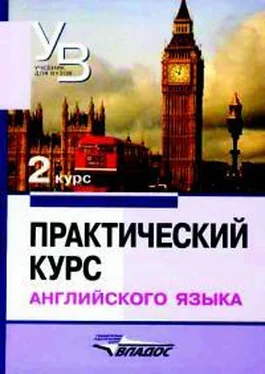to give a good supply of
owing to the shape (rain, etc.)
to flow (from, out of)
to be of great (little, some, no) value
EXERCISES
I. Read the text and do the following (A. Grammar, B. Word usage, C. Word-
formation):
A.1. Pick out all proper names and arrange them into two groups — nouns with the definite
article and without it; explain the use of the article. 2. Search the text for sentences with inversion.
Transform them into regular sentences and compare them with the original ones. Specify what kind
of inversion it is. 3. What tense group is predominant in the text and why?
B.1. Pick out all the adjectives that go together with the following nouns: sea, lake, river;
mountains, hills, cliffs; area, land, field, moors, upland, lowland. 2. Mark all the cases when nouns
are defined by two adjectives; comment on the word order; is it possible to change it? 3. Pick out all
the nouns defined by the adjective small; is it possible to use little instead? 4. Search the text for the
combinations of Adv +Adj ending in -ed, translate them into Russian and use them in sentences of
your own.
C.1. Pick out all the derivatives and classify them according to the suffix. 2. Search the text
for compounds and comment on their structure. 3. Pick out from the text all the words that have
homonyms. Spell, transcribe and classify them.
II. Write English equivalents of the following:
более миллиона тонн, миллионы людей, двести озер, глубиной 600 футов, сотни миль,
длина Темзы немногим больше 200 миль, сотни островков, общая площадь Великобритании
около 94 250 кв. миль или 244 000 кв. километров, население — 56 миллионов человек.
III. a) Make up a list of geographical names used in the text (mind the articles)
and transcribe them.
b) Transcribe and translate the following words:
advantage, canal, channel, comparatively, desolate, determine, estuary, extremely, glorious,
heather, indentation, manufacture, moor, navigable, occasionally, plough, scenery, strait, total, vague,
value, vary, wander, wheat, wind.
с) Translate the following verbs into English. Give their four forms:
пахать, течь, извиваться, меняться, бродить, ценить, снабжать, ломать,
выращивать.
d) Give the plural of the following nouns. Translate them into Russian:
deer, sheep, fish, mouth, foot
IV. Supply adjectives:
1. ... water is warmer than ... water. 2. Cornwall is famous for its ... cliffs. 3. Its ... soil is
deeply cultivated. 4. This part of the country is noted for ... cold. 5. The U. K. ... area is some 94,250
square miles. 6. There are ... fields in the east of England. 7. There are ... harbours for ships. 8. In the
northern Highlands of Scotland you'll enjoy the sight of ... mountains. 9. They were making their
way through ... hills. 10. There were ... plains stretching for miles and miles. 11. Lowlands is the ...
plain of Scotland.
V. Answer the following questions (use the map on p. 240):
1. What do we call the group of islands situated to the north-west of Europe? 2, What are the
names of the biggest islands? 3. Do the United Kingdom and Great Britain mean the same? 4. What
countries are situated on the British Isles? What are their capitals? 5. What is Great Britain proper?
6. What are the names of the waters washing the coasts of the British Isles? 7. Why do the English
call the strait between Great Britain and the mainland the "Strait of Dover" and the French call it
"Pas-de-Calais" (international term)? 8. What are the most important rivers in Great Britain? 9. What
are the names of the chief mountain ranges on the island? 10. Where are the Cumbrian and the
Cambrian mountains situated?
VI. Translate the following sentences in writing. (Consult Essential Vocabulary
(I).) Respond to the questions and statements, using the conversational formulas
(see p. 164, Ex. XI 8):
1. Вы можете показать на карте важнейшие порты Великобритании? 2. Эта карта не
представляет большой ценности. 3. Знаете ли вы, куда впадает река Северн? 4. Благодаря
постоянным дождям реки Англии служат хорошим источником пресной воды. 5. Какие горы
отделяют Англию от Шотландии? 6. К северо-востоку от Шотландии находятся острова. Как
они называются? 7. Остров Мэн имеет сравнительно правильные очертания, судя по карте. 8.
Что может предохранить посевы от сильного холода? 9. Сравнительно большая часть
пахотной земли на юго-востоке Англии занята под пшеницей. 10. В каком районе страны
находятся большие запасы угля? 11. В нескольких милях от Лондона находится город Кройдон
(Croydon), в котором имеется большой аэропорт.
VII. Study the following derivatives and compounds:
sandy, noticeable, plough-land, sea-loving, heather-covered, muddy, navigable, sugar-beet,
low-lying, waterways, fruit-growing.
a) Write out the sentences in which they are used in the text.
b) Use them in sentences of your own.
c) Give English equivalents of the following:
солнечный, туманный, дождливый, снежный, скалистый, грязный, дымный,
водянистый, холмистый, песчаный, сахарный, удлиненный, предпочтительный, ценный,
судоходный, заметный, отделимый, определимый, подходящий.
d) Give Russian equivalents of the following:
variety-show, wheat-field, coal-supplier, ploughman, heather-moor, horseshoe, seashore,
seascape, earthquake;
deer-hunting, wheat-growing, sheep-breeding, crop-gathering, land-ploughing, snow-
ploughing;
shipbuilding (yards), leaf-bearing (trees), nature-loving (nation), furbearing (animals), ocean-
going (steamers), food-producing (industries);
snow-covered (fields), smoke-filled (room), man-made (canal), grass-covered (plain), sea-
bound (ship), weather-beaten (face), moon-lit (path).
VIII. Supply articles where necessary. Write answers to the questions:
1. Look at... map of ... British Isles. Do you know what... two largest islands are called? 2. ...
right-hand side of... map is ... East. What sea is east of ... Great Britain? 3. In what direction is ...
Irish Sea from ... Great Britain? 4. Point to ... body of ... water which is west of ... Ireland. What do
we call it? 5. Towards ... bottom of ... map is ... South. What is towards ... top of ... map? 6. In what
Читать дальше





![Владимир Аракин - Практический курс английского языка 3 курс [calibre 2.43.0]](/books/402486/vladimir-arakin-prakticheskij-kurs-anglijskogo-yazyk-thumb.webp)






